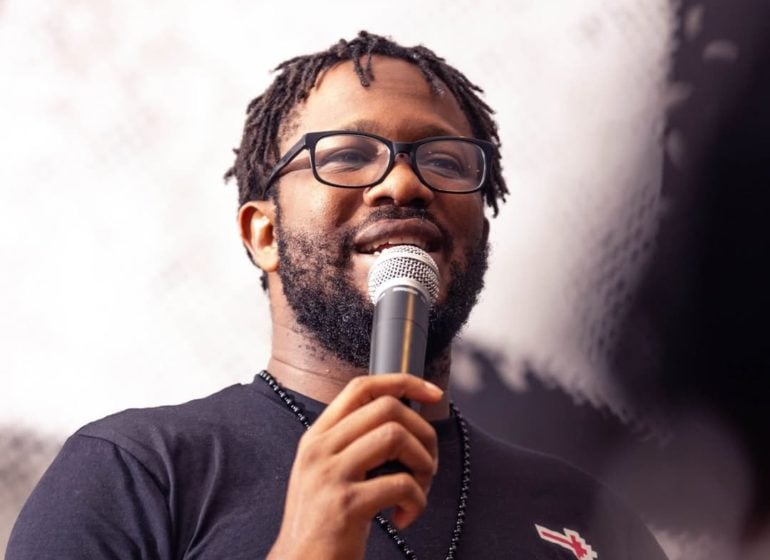James Kalu Omokwe, the Nigerian filmmaker behind acclaimed shows like ‘Riona’, ‘Ajoche’, and ‘Chetam’, has carved a niche for himself through his commitment to telling African stories with depth and originality in the film industry. In this interview with TheCable Lifestyle’s Sulaimon Muhibat, Omokwe reflects on his career journey, shares his thoughts on the recent shift toward cinema releases over streaming, and speaks on why Nollywood must embrace Pan-Africanism before aiming for global recognition.
TheCable Lifestyle: You started as an actor. What inspired your transition into directing and producing?
James: Acting happened to me by accident. It was actually my sister they approached. When I was at UNILAG, my sister and I were going somewhere when someone stopped us and said she would make a great actor.
But she declined and said I do. That’s how I landed my first show called ‘Shallow Waters’, which was quite popular at the time. From there, I got into Tinsel.
What pushed me into producing and directing was my dissatisfaction with the kind of stories being told. They were good, but I wanted to tell authentic African stories; epics, period pieces, and narratives rooted in our culture.
I didn’t feel that I could do that as just an actor because I’d always be at the mercy of the producer or director. So after I finished school, I directed my first film, then did a lot of producing work.
Now, I’m executive producing and directing for Africa Magic and MultiChoice. That’s how my transition into production and directing happened.

TheCable Lifestyle: Your film ‘Osamede’ premiered at the Cannes Film Market. What does that kind of international spotlight mean to you and the story you’re telling?
James: I’m quite excited that we are telling these stories and they’re being accepted globally.
I’m happy that our stories are being told and reaching a wider global audience. We are in the Cannes Film Market, which gives us access to more agents and distributors across the globe and allows our product to be seen in the diaspora.
So, it’s great for me. The recognition is an added feather to my career, and I’m glad that I’m in the space where this happened, not just for me but for the teammates and people who put their hands into making the film.
It’s a great opportunity and trajectory for my career, and I’m here for it.
TheCable Lifestyle: Your son is often seen on set with you, sometimes even taking on roles. What inspires you to involve him so closely in your filmmaking process?
James: I’m working all the time, and I want to spend the holidays with my kid, but it is also important for him to know what his dad does. His mum and I are in production, so he needs to understand the life his parents live.
I’m not saying he would have to be in it at the end of the day; it’s just for him to know about it and learn a couple of things. Once he’s on holiday, he would be on set to watch the monitor, call action and cut, and just bring him into our world.
I ask him every time if he wants to be a filmmaker, but he says he wants to be a YouTuber. But these moments are memories he would cherish forever, spending time with his father on set and all.
He also says it in school a lot, asks his teachers if they have watched my show, so he knows all that, and I think that’s the reason I bring him into my world.
TheCable Lifestyle: Does bringing your son to set influence your filmmaking process?
James: No, not really. I do what I have to do. I just want him to witness it. When I was growing up, I didn’t have the opportunity to be with a father figure and have that influence, so I do this for myself.

Let him know that he has a sounding board while growing up, which helps in his life decisions. For instance, I’m a producer, and one thing you will learn from me is how meticulous we organise stuff, and he can take that and build on it in his trajectory in life.
He enjoys it, and he has been doing it since he was 2 years old.
TheCable Lifestyle: As a director and executive producer, what element in a story captures your attention and compels you to be part of it?
James: I’m about original and authentic stories that haven’t been told before. If you look at all the shows we have done, like Ajoche and Riona, they are authentic stories.
It’s a genre people have done, but done differently, and we want you to pay attention to it because of the different packaging.
Even our new show, The Yard, hasn’t been a show this gritty about the suffering in Nigeria, and for me, that’s an original story based on our daily experience, but we are mirroring it on the show.
For me, I’m just after original, authentically African stories, and those are the things I look for.
If people send me a story and I realise it’s the same story we have seen, I leave it. We want to do something different.
I want to tell stories about Nigeria in the 70s, the first Nigerian who ran at the Olympics, stories around our history. So, I get interested in a story when I see things like that.
TheCable Lifestyle: You won an AMVCA for Itura last year, and this year you were nominated again for Chetam. What does consistent recognition like this mean to you?
James: I think it’s a validation of the hard work that we put into the films that we make. Sometimes you spend days and months preparing for a show and go through a lot to make it happen.

From the story to the physical work, and everything you experience when it’s finally out and people are watching it, you’re always wondering if they like it or not. So I think it’s a validation that people see what we are doing and we are being recognised for it.
TheCable Lifestyle: What’s the biggest compromise you’ve ever had to make for the sake of your art?
James: I don’t think I have made any compromises. I won’t call it a compromise, but there are things I have done that I won’t compromise on. I have walked away from projects, not because I didn’t like the project, but because of the way it was being handled. So, midway through, I leave. The team I work with does a lot of collaborative work, so there is no need for one person to compromise. We are in it together, and we agreed from the beginning. So I don’t think I have been in a space where I had to compromise negatively or in any other way.
TheCable Lifestyle: What’s one misconception about Nigerian filmmakers you wish global audiences would unlearn?
James: There is a misconception that we don’t know how to make films. When people talk about Nollywood movies, they think of low quality and poor storytelling. We are trying to change that impression, which is why ‘Osamede’ premiering at Cannes was important, to make people see that we are not just people who don’t know how to tell stories. There’s a bunch of us who can tell good and enjoyable stories. So we are trying to put Nollywood in a positive light. That’s one stereotypical conversation we are trying to break.
TheCable Lifestyle: There seems to be a growing trend of filmmakers choosing cinemas over streaming platforms. Why do you think this shift is occurring, and what impact do you believe it will have on the industry?
James: If you look at what has happened in the past two years, with Prime Video gone and Netflix reducing investment, we have no other choice. Even though there’s YouTube, cinemas have to be fed, people need to make money, so everyone is returning to that space. I think it’s just a form of innovation. Now that these platforms are not ready, some audiences need to be fed. I think that’s why films are making a comeback into the cinema.
Hopefully, cinemas and more distribution outlets will open up more opportunities in our ecosystem. And by ecosystem, I mean the making of a product, the distribution, the sales, and the profit-making. When Prime Video and Netflix came in, cinemas took a back seat because everyone wanted to make a film for the platform. So now that isn’t happening, we need to find an alternative.
Hopefully, what this does to the market is that it opens more opportunities like local cinemas or maybe other kinds of distribution outlets. I think it’s a good thing and the start of something good for Nollywood.
What I meant about Prime Video being gone is that they shut down in Africa and Asia. They created content in these continents for a while, but changed strategy due to the declining economy. And you can’t blame them for changing tactics, all their offices in Africa and Asia were shut down.
TheCable Lifestyle: Beyond film festivals and markets, what do you think Nigerian filmmakers need to truly break into global cinema on a larger scale?
James: Here’s an unpopular opinion. I don’t think Nigeria should be trying so hard to break into global cinema. I think we need to figure it out at home first. There’s nothing wrong with going global, but we should focus on our distribution solutions, distribute our films across Africa, and other people will accept us.
Look at India. It’s an India-first market. They don’t go to other countries before focusing on their own. We need to be Pan-African in terms of filmmaking in Africa. That’s what we need to figure out. Do we need to invest more in African cinema?

Should we collaborate with other countries? We need to focus on Africa first before we think globally, because it’s only when we accept ourselves that the world will accept us.
To enhance this, there are some steps I’m taking. I might not be able to fully share them yet, but they are geared toward understanding how the ecosystem works and finding solutions for creating an end-to-end value chain. It’s something we’ve been discussing for three years, and we’re actively working on it. One of the experiments was Osamede. Once we’ve solidified that, we can make it accessible to other filmmakers.
Copyright 2025 TheCable. All rights reserved. This material, and other digital content on this website, may not be reproduced, published, broadcast, rewritten or redistributed in whole or in part without prior express written permission from TheCable.
Follow us on twitter @Thecablestyle

